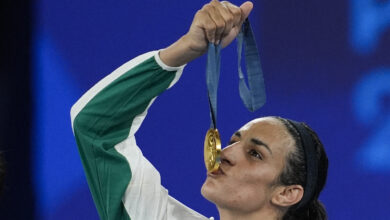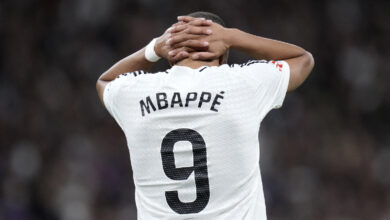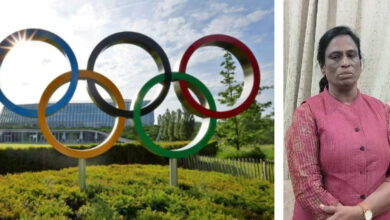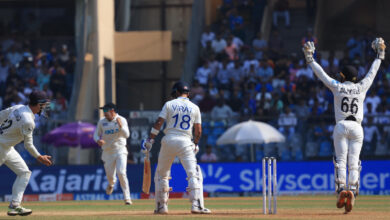India’s Olympics bid: From multiple stages of dialogue to guarantees, long process before India could be awarded Games in 2036 | Sport-others News

On Saturday evening, Prime Miner Narendra Modi revealed India’s ambition to host the Olympics in 2036, stating that the adminration would “leave no stone unturned” in getting the Games to the country for the first time. It is learnt that the Indian government and the Indian Olympic Association (IOA) will form a joint committee in the coming weeks to explore the way ahead for the bid. There will be no decision on awarding the 2036 Olympics at least until the IOC’s election next year. It must also be noted that the bid to host the Olympics does not have to be restricted to just one city, it can be a multi-city, a regional, or even a “multi-nation” bid.
Even before PM Modi made the announcement at the Opening Ceremony of the 141st IOC Session in Mumbai, it is learnt that India had already sent a letter to the International Olympic Committee to join continuous dialogue a “little while ago”. It is also learnt that the IOC members had an “informal catch up” with IOA chief PT Usha and Sports Miner Anurag Thakur on the sidelines of the IOC Session.
In the coming years, India will need to take many giant leaps before they are awarded the Olympics. The Indian Express got Jacqueline Barrett, who is the Future Olympic Games Hosts Director, and IOC’s Director of Corporate and Sustainable Development, Marie Sallois, to break down what will happen next.
Barrett mentioned that just like from India, the IOC had also received similar interest from about ‘double-digit’ countries so far.
“It’s still early days (for the Indian bid) and there’s no rush. But the ambition is clear,” Barrett told The Indian Express.
When will the Games be awarded?
Tokyo and Paris were awarded the Olympics seven years before the Games were to be hosted. Brisbane was awarded the 2032 Games 11 years before the Games.
Barrett, who is the Future Olympic Games Hosts Director, pointed out that there is no fixed deadline in place to make a decision as to who will host the 2036 Olympics. She added that the decision could be kept as late as 2030.
“We’re not setting artificial deadlines. Things are changing exponentially fast in the world. Be it geopolitically, from the social point of view, or economically. It’s too early today to say what might be the situation in 2036. We have been very clear to say that for the next Summer Games in 2036, it’ll be the responsibility of the next IOC leadership (the election will happen in 2025),” said Barrett before adding that a decision for 2036 might not be taken before 2026-27, potentially even later.
What are the stages that any bid goes through before the IOC accepts it?
Once a city or a region sends a letter to the IOC signalling its intent to host a future edition of the Olympics, the IOC gets into a “continuous dialogue phase” with them. It must be noted that the continuous dialogue does not specifically have to be regarding the 2036 Games. It could also be about a later edition as well.
There is no real timeline for how long the continuous dialogue phase might last as this is a non-committal stage (a host city can dip its feet in the water and back out). Once there is a seriousness in a bid to progress to the next level, the bid will enter the “targeted dialogue phase” where a city/region would be known as a preferred host city.
“The nature of this continuous dialogue is that there is no start or end. It’s an exchange process, where we go at the pace of the interested parties. The idea is to develop each project at its own speed,” said Barrett. “Continuous dialogue is not edition specific. It does not force anybody into hosting an Olympics in a year that might not be right for them.”
What happens in the continuous dialogue phase?
In the really initial days of conversation, the IOC looks at the vision of the hosts.
“If you’re going to come to the table (to bid for an Olympics), why? You’d be surprised at how many countries find that question difficult. It’s great to want to host the Games, but what are you trying to achieve through it? It’s thinking about that long-term legacy that’s really important. After that it’s putting together a master plan: where would you want to do it, why are you choosing that region, where would it make the most sense. We want the Games to help an exing ambition develop,” said Barrett.
Sallois pointed out that the IOC is not looking for hosts to follow a particular template in hosting of the Games. It does not want one Olympics edition to resemble all the others before it, but an edition to stand out in its own unique way.
“(We’re looking at) What are you trying to achieve from the Games in your local context? It’s good to get inspiration from the past, but we want to know how you’ll look at the future in your context,” said Sallois, who is the IOC’s Director of Corporate and Sustainable Development.
Once the bid starts gaining shape, IOC then looks at capacities, infrastructure and the support a bid has from all levels of government, and other stakeholders like the private sector, from the general public.
“Through this new process, we are trying to reduce costs and the number of losers,” said Barrett. “It’s great when there’s excitement and so many people are bidding but the sad part is that only one entity is awarded the Games. We want to make sure that not so much money is spent on winning.”
Once a bidding city/region covers these bases, the IOC’s Future Host Commission for Summer Olympics can recommend to the IOC Executive Board to enter into a targeted dialogue phase with the bidder.
What happens in the targeted dialogue phase?
Barrett said that it is usually in the targeted dialogue phase that the IOC’s team will visit a potential host to look at infrastructure.
“Targeted dialogue is really a deep dive. We would know a lot about the project already this point a bid reached the targeted dialogue stage. It’s more structured. Each preferred host will answer a detailed questionnaire and then provide a number of guarantees to support the belief that this is our Games! At that point, there might be a visit to the preferred host,” said Barrett.
What are the guarantees that a host needs to give?
There are over 20 guarantees that a host of the Olympics need to furnish to the IOC before hosting the Olympics.
This includes infrastructure guarantees, accommodation agreements, security guarantees, public services guarantee, government services guarantee etc.
Will India have to create venues?
As part of the IOC’s vision to reduce hosting costs for nations, they have put an emphasis on getting bidding nations to use exing venues or temporary venues.Most Read
1
‘Cowards just sweep against spin’, the way ‘Babar Azam and Mohammad Rizwan played spin was bizarre’: Rashid Latif hits out
2
Bigg Boss 17 confirmed l of contestants: Munawar Faruqui, Ankita Lokhande-Vicky Jain, Isha Malviya-Abhishek Kumar in Salman Khan show
See More
It must also be noted that PM Modi or the IOA have not yet revealed which city or region will be backed to bid for the Olympics.
Barrett also pointed out that venues of the Olympics do not have a set limit for how many fans it can accommodate.
“The main message for any prospective hosts is that the Games are going to change exponentially. We tell everyone to work on the Games for the future. The Games of the new era!”







